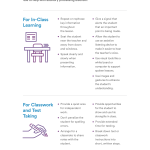Accommodations for Auditory Processing Disorder: Breaking Down the Barriers

Hey there, friends. Today, we’re going to talk about something really important: accommodations for auditory processing disorder. If you’re anything like me, you probably know someone who’s struggled with this condition. Maybe it’s a family member, a friend, or even you yourself. Whatever the case, it’s essential to understand what accommodations for auditory processing disorder are and how they can make a huge difference in someone’s life.
What is Auditory Processing Disorder?
Before we dive into accommodations, let’s quickly go over what auditory processing disorder (APD) is. APD is a condition where the brain has trouble processing sounds, making it hard to understand speech, follow conversations, and even learn new things. It’s not because someone’s not paying attention or isn’t smart enough; it’s just that their brain needs a little extra help.
Accommodations for Auditory Processing Disorder in the Classroom
For kids with APD, school can be a real challenge. That’s why accommodations in the classroom are crucial. Here are some ways teachers and schools can help:
Preferential Seating
Giving a student with APD a seat near the front of the classroom or close to the teacher can make a big difference. This way, they can hear the teacher more clearly and see their face, which can help with lip-reading.
Visual Aids
Using visual aids like diagrams, charts, and pictures can help students with APD understand complex information better. It’s also a good idea to provide printed copies of notes and handouts.
Breaking Down Instructions
Breaking down instructions into smaller, simpler steps can help students with APD follow along. It’s also helpful to give them a chance to ask questions and clarify anything they don’t understand.
Extra Time
Giving students with APD extra time to complete assignments and tests can really help reduce stress and anxiety. This way, they can take the time they need to process information and do their best work.
Communication with Teachers
It’s essential for parents and students to communicate with teachers about their APD diagnosis and any accommodations they need. This way, everyone’s on the same page, and the student can get the support they require.
Accommodations for Auditory Processing Disorder in the Workplace
APD doesn’t just affect kids; it can also impact adults in the workplace. Here are some accommodations that can help:
Noise-Cancelling Headphones
Providing noise-cancelling headphones or earplugs can help employees with APD focus and block out distracting background noise.
Visual Aids
Using visual aids like diagrams, charts, and pictures can help employees with APD understand complex information better. It’s also a good idea to provide printed copies of meeting notes and handouts.
Clear Communication
Encouraging clear communication among colleagues can really help employees with APD. This means speaking clearly, facing the person when talking, and avoiding background noise.
Flexible Work Arrangements
Offering flexible work arrangements, such as working from home or adjusting work hours, can help employees with APD manage their workload and reduce stress.
Providing Written Instructions
Providing written instructions or summaries of meetings can help employees with APD process information better and follow along.
Accommodations for Auditory Processing Disorder at Home
Accommodations for auditory processing disorder aren’t just limited to the classroom or workplace. Here are some ways families can help at home:
Creating a Quiet Environment
Creating a quiet environment at home can really help individuals with APD focus and relax. This means turning off the TV, reducing background noise, and encouraging family members to speak quietly.
Using Visual Aids
Using visual aids like charts, diagrams, and pictures can help individuals with APD understand complex information better. It’s also a good idea to provide written instructions or reminders.
Breaking Down Tasks
Breaking down tasks into smaller, simpler steps can help individuals with APD follow along. It’s also helpful to give them a chance to ask questions and clarify anything they don’t understand.
Encouraging Self-Advocacy
Encouraging individuals with APD to self-advocate can really help them build confidence and communicate their needs effectively. This means teaching them how to ask for help, express their needs, and stand up for themselves.
Assistive Technology for Auditory Processing Disorder
Assistive technology can be a game-changer for individuals with APD. Here are some examples:
Text-to-Speech Software
Text-to-speech software can help individuals with APD read and understand written text better. This software can convert written text into speech, making it easier to follow along.
Speech-to-Text Software
Speech-to-text software can help individuals with APD write and communicate more effectively. This software can convert spoken words into written text, making it easier to write emails, messages, and reports.
Noise-Cancelling Headphones
Noise-cancelling headphones can help individuals with APD focus and block out distracting background noise.
Accommodations for Auditory Processing Disorder: A Recap
In conclusion, accommodations for auditory processing disorder are essential for helping individuals with APD navigate the world. By providing the right supports and accommodations, we can help individuals with APD build confidence, communicate effectively, and reach their full potential.
Accommodations for Auditory Processing Disorder: What You Can Do
So, what can you do to help? Here are some ways you can make a difference:
- Learn more about APD and its effects on individuals and families
- Volunteer to help organizations that support individuals with APD
- Advocate for accommodations and supports in your community
- Encourage individuals with APD to self-advocate and communicate their needs effectively
Closing Thoughts: Accommodations for Auditory Processing Disorder
Accommodations for auditory processing disorder are not just a nicety; they’re a necessity. By providing the right supports and accommodations, we can help individuals with APD build a brighter, more inclusive future. So, let’s get started and make a difference in the lives of individuals with APD.
<